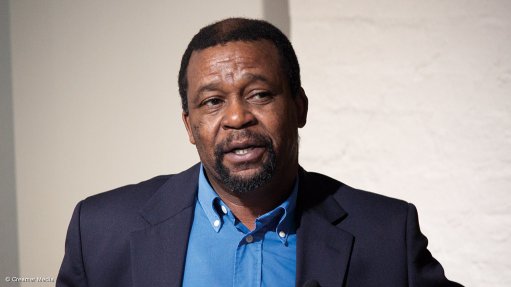
Mistra executive director Joel Netshitenzhe
Photo by: Darlene Creamer
Democracy without socio-economic rights is ineffectual and South Africa’s extreme inequality is untenable and threatening to erupt as the poor became increasingly despondent, said Mapungubwe Institute for Strategic Reflection (Mistra) executive director Joel Netshitenzhe.
He said this was partly because progress was accompanied by greater expectation.
Mistra launched its report ‘Understanding South Africa’s Democratic Trajectory: A comparative analysis of post-colonial societies’ on Thursday, in partnership with Open Society Foundation for South Africa (OSF-SA).
The report examines empirical evidence about whether South Africa’s current democratic trajectory is exceptional or substantially comparable to other post-colonial experiences, such as those of Mozambique, Algeria and India.
Netshitenzhe presented the findings alongside OSF-SA executive director Bulelwa Ngwewana, Mistra project management director Xolelwa Kashe Katiya and former Constitutional Court Judge Albie Sachs.
Understanding post-colonial trajectories of other countries, as well as our own, would help South Africa chart a way forward, said Netshitenzhe, adding that path dependency in previously colonised societies had become a norm and South Africa must chart its own trajectory.
Post-colonial States revealed a path dependency syndrome, with most societies that attained liberation primarily through the barrel of the gun tending to have a strong military culture with disproportionate influence on the ruling party itself.
The report said South Africa, under the African National Congress government, seemed to have been inoculated from this variety of military interference, which was not the case in Algeria and Mozambique.
Netshitenzhe added that although Mozambique's economic growth trajectory was consistent for two decades, it did not yield favourable socio-economic outcomes in terms of basic education.
Despite Algeria’s liberation movement, it's army gained dominance, resulting in poor democratic consolidation.
And, India's liberal democracy had now evolved to a situation in which right-wing religiosity holds sway, he said.
“South Africa has got all the major characteristics of a liberal democracy. Its poor socio-economic conditions internally can be mainly attributed to poor State capacity,” he concluded.
While significant efforts were being made to root out corruption, Netshitenzhe warned that it remained a serious threat to the quality of democracy, as well as to prospects for socio-economic development.
Katiya said Algeria and India were very useful in pointing out South Africa's "exceptionalism" or lack thereof.
However, Sachs said South Africa’s constitutional democracy could be regarded as exceptional.
Meanwhile, the report says for democracy to consolidate properly, there needs to be a continuous involvement and inclusion of citizens in their own and the country’s development.
In part, this refers to the public seeing themselves as stakeholders and benefactors of socio-economic transformation programmes that should be created deliberately to ensure inclusive development.